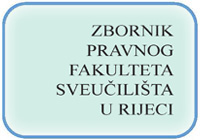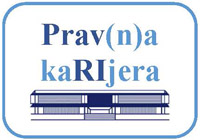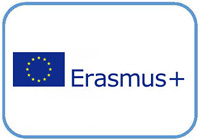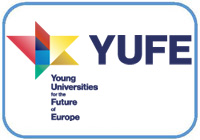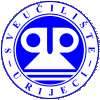Projects
International Scientific Conference: Justification of the employment of youth in atypical forms of employment
Presentations from the conference
Professor Frans Pennings (Utrecht University, Netherlands)
The young at work - Experiences in the Netherlands
Professor Laura Calafà (University of Verona, Italy)
Young persons in work and new forms of employment in Italy
Željko Marković, Head (Rijeka Regional Centre, Croatian Employment Service)
Hrvatski zavod za zapošljavanje i atipični oblici rada
Nenad Seifert, Head (Rijeka Regional Office, Croatian Employers' Association)
Mladi i tržište rada
Assistant Professor Vanja Smokvina (University of Rijeka)
The work of youth and new forms of employment with special emphasis on The measure on occupational training without commencing employment
Professor Sandra Laleta (University of Rijeka)
Full-time students' employment in Croatia
Darko Šeperić (Union of Autonomous Trade Unions of Croatia)
Zapošljavanje mladih - stajališta sindikata
Dijana Kesonja (Advisor at Ombudswoman for Croatia)
Stručno osposobljavanje – prednosti, nedostaci i izazovi
International seminar „Current issues of coordination of family benefits“
The international seminar “Current issues of coordination of family benefits” took place at the Faculty of Law in Rijeka on 26 April 2019. The seminar was organised as an activity within the project Erasmus+ Jean Monnet Module “EU Social Security Law” (project no.: 574674-EPP-1-2016-1-HR-EPPJMO-MODULE).
Family benefits form an important part of the coordination of social security systems in the EU Member States. Although they may be very different, they are intended to meet family needs and are granted in connection with the family situation of a beneficiary. They form an important part of social security systems, and they can serve multiple purposes, such as protection from poverty, raising the quality of life or as measures of demographic policies. As such, they are strongly rooted in national traditions and linked to the standard and costs of living in a certain state. The EU social security coordination rules in this field are designed to enable all those moving within the Union to keep their entitlement to benefits, but they also lay down priority rules which prevent overlapping of family benefits accorded under the legislation of the competent state and under the legislation of the Member State of residence of family members. Many legal and practical issues surround the coordination of family benefits in the EU, especially lately. Long-standing debates in many EU countries have led to changes in legislation, and their compliance with EU law and the principle of equality is questionable.
This seminar has gathered leading experts and practitioners in the field of social security to present the latest developments in coordination of family benefits in Austria, Slovenia, Germany and Croatia. The migration flows among these countries are traditionally strong, and coordination is an inevitable issue. Many current questions associated with coordination of family benefits in these countries were addressed and discussed at the seminar.
The seminar started with a short introduction in the issues and the presentation of the Jean Monnet Module “EU Social Security Law”, financed within the Erasmus+ program of the European commission and implemented at the Faculty of Law in Rijeka in the period from 2016-2019. After this, the first presentation on the new challenges in the coordination of family benefits in the EU was held by Prof. Grega Strban from the Ljubljana Law Faculty. It was followed by the presentation on the current problems of indexation and export of family benefits from the Austrian perspective by Prof. Elias Felten from the Faculty of Law in Linz. Mag. Martina Thomasberger from Arbeitskammer Wien has proceeded to provide an excellent and detailed overview of the most important cases and problems arising in the Austrian practice on a daily basis. Dr. Eva Maria Hohnerlein from Max Planck-Institut für Sozialrecht und Sozialpolitik in Munich has presented the German experiences and case law developments associated with cross-border family benefits. The seminar was closed with the presentation on the Croatian family benefits by Asst. Prof. Adrijana Martinović.
We are very proud by the fact that the seminar was attended by 48 participants, among which many representatives from the competent bodies for coordination in Croatia and Slovenia, legal professionals, but also students at the last year of their legal studies in Rijeka. In a lively and constructive atmosphere, the participants have concluded that this subject deserves further and continued attention, as it represents a very important cross-border issue affecting daily lives of EU citizens and their families. Presentations from the seminar are available here (please request a password from This email address is being protected from spambots. You need JavaScript enabled to view it.).
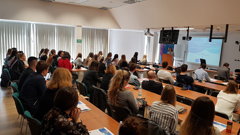
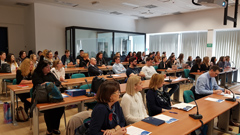
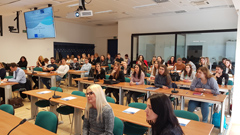
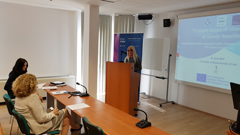
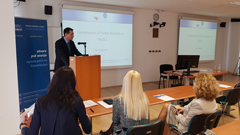
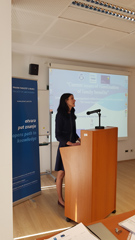
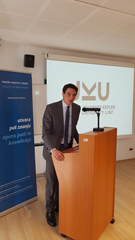
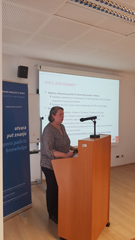
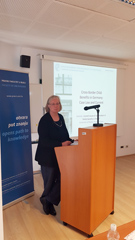
International Scientific Conference: Flexicurity and New Forms of Employment – The Challenges of the Modernization of Croatian Labour Law
Pictures Gallery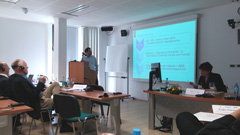
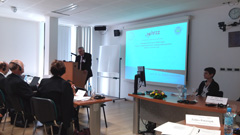
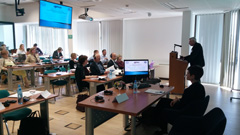
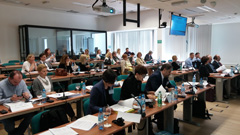
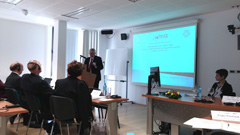
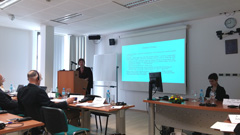
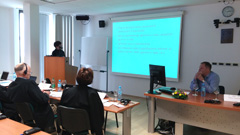
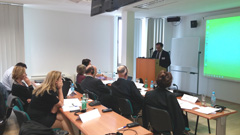
International Scientific Conference: 3rd Rijeka Sports Law Day, Introduction to EU sports law, The legal framework in Football – different aspects
Pictures Gallery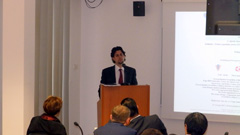
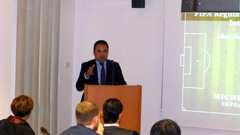
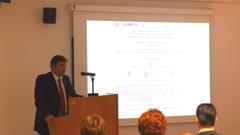
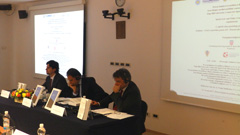
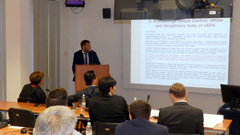
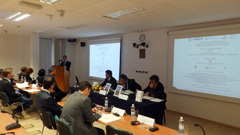
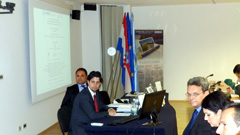
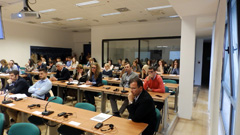
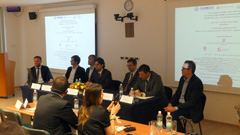
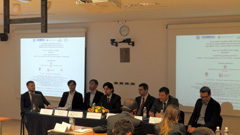

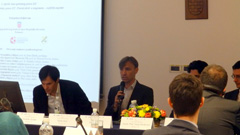
International Scientific Conference: Justification of the employment of youth in atypical forms of employment
Pictures Gallery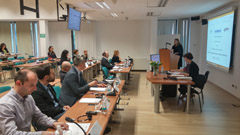
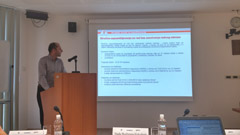
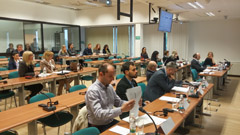
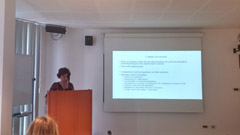
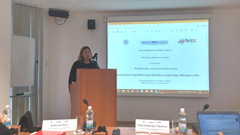
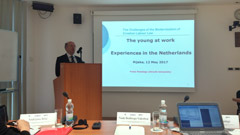
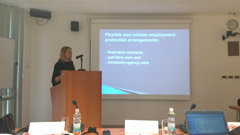
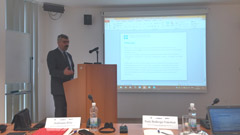
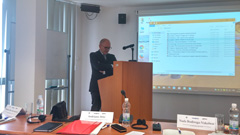
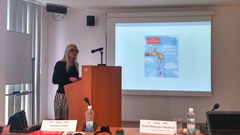
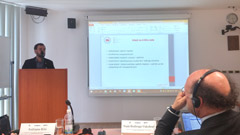
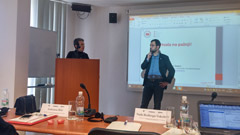
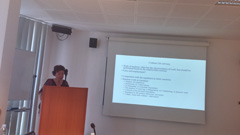
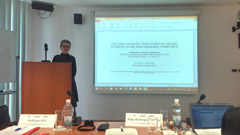
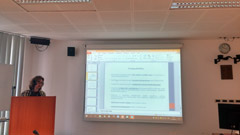
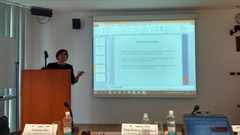
Erasmus+ Jean Monnet Module “EU Social Security Law”
|
Project Reference: 574674-EPP-1-2016-1-HR-EPPJMO-MODULE Start: 01.09.2016 – End: 31.08.2019 Academic coordinator Asst. Prof. Dr. Adrijana Martinović |
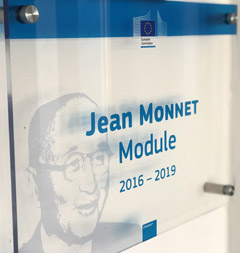 |
Summary
The module’s objective is to create a specialised course in EU social security law, as an elective course at the fifth and final year of the integrated Study of Law. Its basis will be the existing course Social security and competition law. The module proposes a teaching upgrade in terms of its contents and methodology. The teaching of EU social security law has so far been only marginal at the Croatian law faculties and there is a compelling need for a separate course in view of the increased mobility of Croatian nationals as EU citizens. Involvement of guest lecturers is envisaged as a way to advance the understanding of the EU dimension of social security and make use of their teaching experience. Module’s outcomes primarily include:
- reform of the existing course Social security and competition law by broadening its content to include all matters of EU social security law;
- preparation of a first comprehensive textbook on EU social security law in Croatian;
- creation of open-access website with teaching materials;
- organisation of a one-day seminar on open issues of EU social security law.
This is a novel approach in teaching, aiming to stimulate wider multi-disciplinary discussions and revise the teaching contents in view of practical problems in the application of EU social security law.
Objectives
The traditional approach to teaching social security in Croatia is primarily nationally oriented, resulting in the fact that EU social security law is almost completely absent from the curriculum as a self-standing course in Croatian law faculties. Given the increased mobility of Croatian nationals, particularly after Croatia joined the EU, this traditional approach has to be changed. The primary objective of this module is to reform the teaching of a specific EU related subject and to create a customized course which will modernize the conventional teaching approach to social security issues. The module’s objective is to equip students and future young professionals with specific knowledge of EU social security law, relevant for their academic and professional lives. Another important objective is to foster engagement of young academics in teaching and research of European subjects. The module creates a network of experienced and younger academics from diverse legal backgrounds (Slovenia, Austria, Hungary and Croatia) and guarantees academic excellence by combining teaching, networking and collaboration.
Impact
Module’s impact is visible on three levels:
- institutional: it will reshape the existing course and offer students at the start of their professional careers a specialised knowledge in EU social security law and thus reinforce the teaching of EU law related subjects at the University of Rijeka;
- local and national: outputs (textbook, open-access web repository) will be accessible to all interested parties in libraries, bookshops and Internet;
- European and international – visiting lecturers, experts in the field of social security will share their experience and knowledge and the module will thus stimulate academic cooperation in the region and beyond.
Methodology
The module will be delivered in the form of lectures, complemented with several methods and strategies of active teaching, such as case study, discussion, brainstorming, problem-based teaching and group work. The module is delivered as an elective course at the final year of study and its content makes it particularly suitable for establishing a more flexible teaching – learning relationship. Intellectual involvement of the students in the learning process will be required and the teaching will be concentrated on developing the students’ procedural knowledge, fostering cognitive interaction, as well as reflection and metacognitive activity.
Activities
- 28 November 2016: Lecture Asst. Prof. Dr. Gabriella Berki
- 2 December 2016: Lecture Asst. Prof. Dr. Erika Kovács
- 9 December 2016: Lecture Prof. Dr. Grega Strban
- 15 December 2017: Lecture Prof. Dr. Grega Strban
- 13 November 2018: International Symposium „Personalized medicine – research diagnostic: indicator or information“
- 11 January 2019: Lecture Ms. Nada Rupčić, HZMO
- 16 April 2019: International seminar „Current issues of coordination of family benefits“
Teaching materials
Repository „EU social security law“ (please request your password This email address is being protected from spambots. You need JavaScript enabled to view it.)
E-book "Osnove prava socijalne sigurnosti EU" (please request your password This email address is being protected from spambots. You need JavaScript enabled to view it.)
About the Erasmus+ Jean Monnet Module
Jean Monnet Activities are designed to promote excellence in teaching and research in the field of European Union studies worldwide. The activities also foster the dialogue between the academic world and policy-makers, in particular with the aim of enhancing governance of EU policies.
A Jean Monnet Module is a short teaching programme (or course) in the field of European Union studies at a higher education institution. Each Module has a minimum duration of 40 teaching hours per academic year. Teaching hours are taken to include direct contact hours in the context of group lectures, seminars, tutorials and may include any of the aforementioned in a distance learning format but do not include individual instruction. Modules may concentrate on one particular discipline in European studies or be multidisciplinary in approach and therefore call upon the academic input of several professors and experts.
Erasmus+ supports Jean Monnet Modules with the aim to:
- promote research and first teaching experience for young researchers and scholars and practitioners in European Union issues;
- foster the publication and dissemination of the results of academic research;
- create interest in the EU and constitute the basis for future poles of European knowledge, particularly in Partner Countries;
- foster the introduction of a European Union angle into mainly non EU related studies;
- deliver tailor-made courses on specific EU issues relevant for graduates in their professional life.
 |
Co-funded by the Erasmus+ Programme of the European Union |
International Scientific Conference Organisation of the labour market: stimmulating innovation and the growth of skills
Pictures Gallery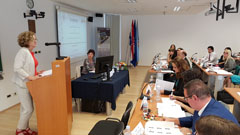
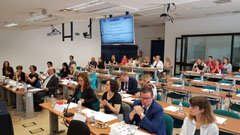
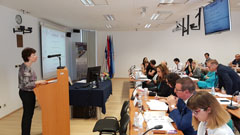
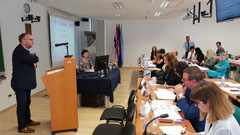
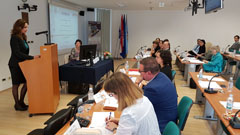
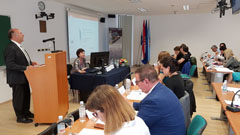
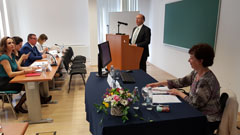
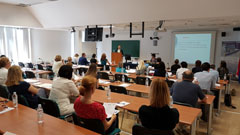
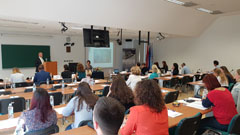
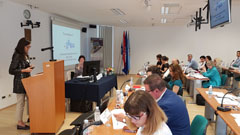
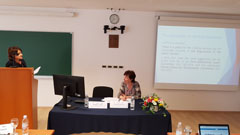
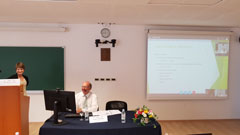
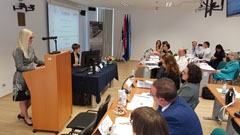
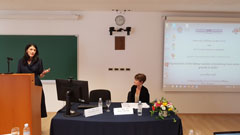
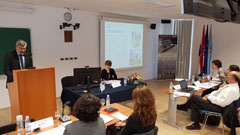
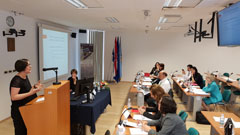
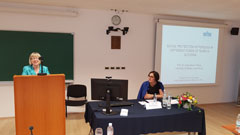
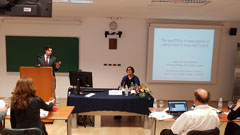
More Articles...
- Understanding, Evaluating, and Improving Good Governance in the Employment Relations of Athletes in Olympic Sports in Europe - EMPLOYS
- Promoting a Strategic Approach to EU Sport Diplomacy
- „Flexicurity and New Forms of Employment (Challenges regarding Modernization of Croatian Labour Law)“
- Issues in Recognising Temporary and Safeguard Measures








